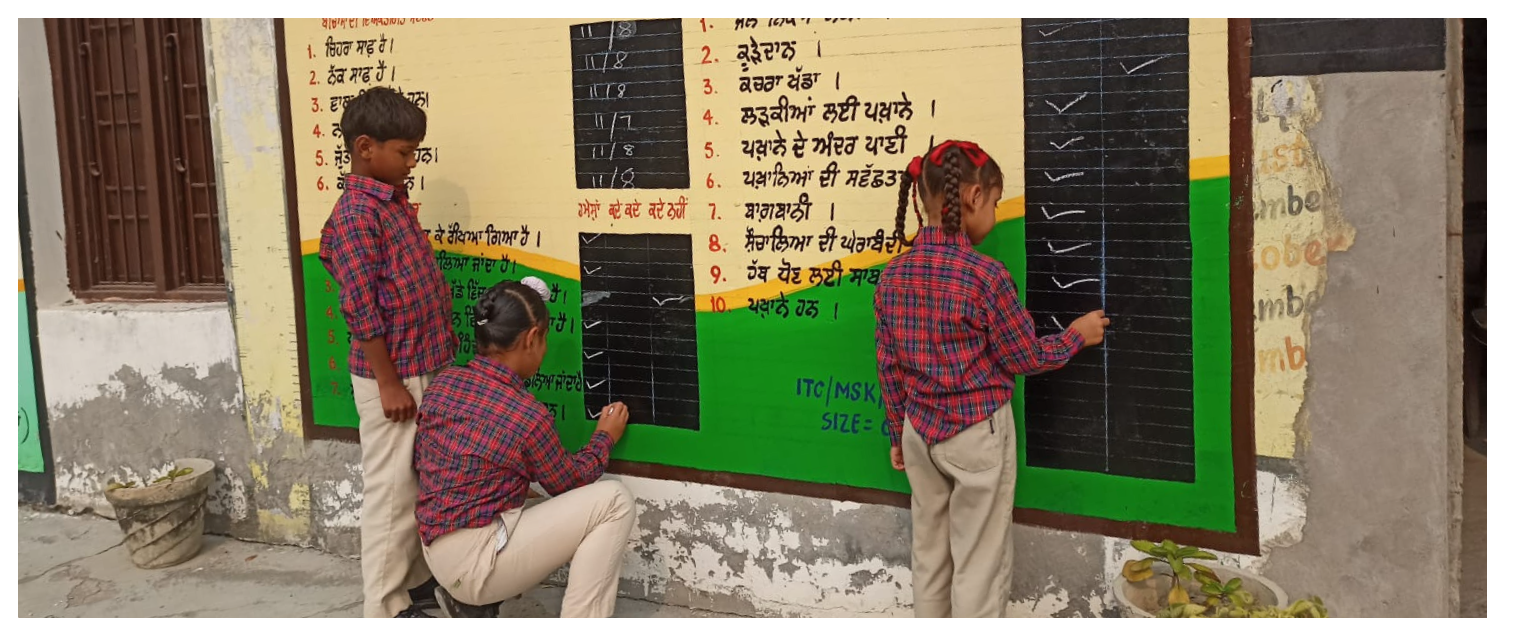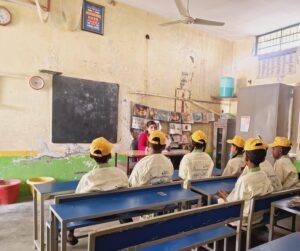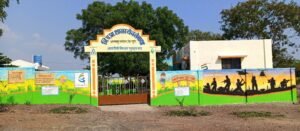
WASH For A Brighter Tomorrow How?
The transformation of a government primary schoolfrom a routine institution to a model of child-led hygieneand sanitation management exemplifies the impact ofthe FINISH Society’s School WASH initiative. Withtechnical support from our team and strategic guidancefrom our donor—our mentor and partner in this journeythis initiative aims to create sustainable behaviourchange alongside infrastructural improvements, laying afoundation for long-term health and educationalbenefits.
Why We Do This
Schools in rural India often face challenges such as inadequate sanitation infrastructure, low attendance,poor hygiene practices, and minimal studentengagement. These conditions directly affect thelearning outcomes and well-being of students,especially girls. The School WASH program underFINISH Society was conceptualized to address thesegaps by integrating hygiene education, student-ledleadership, and basic infrastructure upgrades into aunified model.
The objective is to not just improve physical conditionsbut to instil a sense of ownership among children,teachers, and the school community. It is rooted in thebelief that when children are empowered withknowledge and responsibility, they can becomepowerful agents of change both in school and at home.
How We Do This:
The FINISH Model- The School WASH initiative adopts a two-fold strategy:
- Behavioural Change Through Child Participation.
- Infrastructure Development to Support Hygiene Practices.
A key innovation is the formation of “Child Cabinets”,where students are elected to lead various portfoliossuch as Health Minister, Swachhta Minister,Environment Minister, and Finance Minister.
These young leaders are trained and mentored to:
- Monitor personal hygiene and school cleanliness,
- Organize handwashing campaigns and awarenessrallies,
- Maintain hygiene and operations checklists,
- Manage soap banks and cleanliness materials.
To make these responsibilities meaningful, the programintroduced the concept of a student-led Hygiene Fund.Every child contributes a nominal annual amount,managed by the Finance Minister of the Child Cabinetand overseen by school staff. This fund ensures acontinuous supply of soap, cleaning materials, andhygiene products creating ownership and reducingexternal dependency.
Creating Enabling Infrastructure
The infrastructural interventions are designed tobe cost-effective, inclusive, and sustainable, suchas:
- Construction and retrofitting of gender-segregated, accessible toilets,
- Installation of low-cost handwashing stationsmade from recycled materials or equippedwith aerator taps to conserve water,
- Greywater treatment units, includingevapotranspiration pits and see-saw pumps,where play-based activity like see-sawinghelps pump water into overhead tanks,
- Rainwater harvesting systems
- Development of smart classrooms,amphitheaters, compost pits, kitchen sheds,and BALA (Building as Learning Aid)paintings,
- The kitchen garden concept is introducedusing treated greywater, further linkingsanitation with nutrition and environmentalawareness.
These interventions are not done in isolation. Co-funding models have been developed whereinschool management committees and parentscontribute up to 30% of the infrastructure costs,reinforcing community ownership and pride.
Outcomes and Impact
The changes are visible and transformative:
- Clean and functional toilets are a norm, not ararity
- Children actively monitor hygiene andsanitation, cutting nails, washing hands, andkeeping surroundings clean
- Wastewater is reused for gardening, andcleanliness drives are part of the schoolculture
- Parent involvement has deepened, reinforcinghygiene practices at home
What once were shy, hesitant children are nowconfident, articulate leaders advocating for healthand dignity. Teachers have evolved into facilitatorsof change, working alongside students beyond theconfines of classrooms.Scaling a Culture of ResponsibilityThis model, driven by “My School, MyResponsibility”, is now being replicated in otherregions with contextual adaptations.
The focus going forward is on:
- Strengthening community participation
- Scaling to more schools and Anganwadis
- Promoting locally rooted, sustainable solutions
With strategic guidance and support from ourdonor partners, this program not only addresseshygiene gaps but contributes to larger goals ofeducation, health, gender equality, andsustainable development. As we celebrate 15years of FINISH Society, the School WASHinitiative stands out as a shining example of howsimple, child-centric interventions can reshapeecosystems. It’s not just about clean toilets orsoap—it’s about building a generation that learnsbetter, lives healthier, and leads change for yearsto come.
 Kapurthala, Punjab – Building ResilienceThrough Behavior ChangeIn northern India, the teams in Kapurthala have beenfocusing on behavior change communication. Byworking closely with religious institutions, localinfluencers, and self-help groups, they’ve addressedthe social and cultural barriers around wastehandling. Their campaigns have led to improvedwaste segregation, composting at religious sites, andactive participation by women in planning andmonitoring local sanitation efforts.
Kapurthala, Punjab – Building ResilienceThrough Behavior ChangeIn northern India, the teams in Kapurthala have beenfocusing on behavior change communication. Byworking closely with religious institutions, localinfluencers, and self-help groups, they’ve addressedthe social and cultural barriers around wastehandling. Their campaigns have led to improvedwaste segregation, composting at religious sites, andactive participation by women in planning andmonitoring local sanitation efforts.

Ranjangaon, Maharashtra – Teams WinningPublic TrustIn Ranjangaon, the team under the ITC MissionSunehra Kal project has won accolades for theiroutstanding work in solid waste infrastructure. Theirclose coordination with the Gram Panchayat andcontinuous engagement with local schools hastransformed not just waste systems, but mindsets.Their efforts recently earned them a trophy onIndependence Day, recognizing the impact made inZP School Malthan and surrounding communities.

